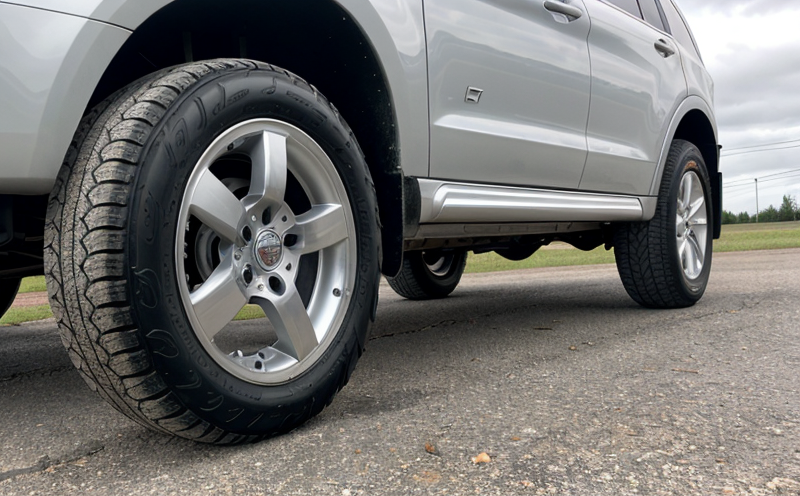EN 13261 Magnetic Particle Inspection of Axles
The European Standard EN 13261 specifies the method for magnetic particle inspection (MPI) to detect surface and near-surface defects in axles used in railway transportation. This service ensures compliance with industry standards, enhancing safety and reliability by identifying potential flaws that could compromise operational integrity.
The process involves applying a magnetic field to the axle under test using either direct or alternating current. The application of an appropriate magnetic suspension (a wet or dry system) allows for the detection of surface-breaking defects such as cracks, folds, seams, and other discontinuities. This method is particularly effective in identifying flaws that are not visible through visual inspection alone.
For this service to be effective, thorough specimen preparation is essential. The axle must first be cleaned, degreased, and dried before the application of magnetic suspension. Care should also be taken during transportation of the axle to prevent damage or contamination. Once prepared, the axle undergoes a rigorous inspection process that includes:
- Magnetic field generation
- Application of magnetic suspension
- Inspection using a suitable lighting and magnification method
- Evaluation of results against predefined acceptance criteria
The accuracy and reliability of the results depend heavily on the expertise of the technicians conducting the inspection. Our team ensures that all tests are performed in accordance with EN 13261, ensuring compliance with international standards.
Real-world usage notes highlight the importance of this service. In railway transportation, where safety is paramount, any defect can have severe consequences. By adhering to EN 13261, we contribute significantly to maintaining high safety standards and minimizing the risk of accidents.
- Quality and Reliability Assurance: The process ensures that axles meet stringent quality requirements, thereby enhancing overall reliability.
- Competitive Advantage and Market Impact: Compliance with EN 13261 can provide a competitive edge by demonstrating commitment to safety and regulatory compliance.
Quality and Reliability Assurance
The magnetic particle inspection (MPI) service, as specified in EN 13261, plays a crucial role in ensuring the quality and reliability of axles used in railway transportation. By identifying surface and near-surface defects early on, this process significantly reduces the risk of operational failures that could compromise safety.
- Reduction in Failures: Regular MPIs help in minimizing the occurrence of failures due to undetected flaws.
- Enhanced Safety: By ensuring that only defect-free axles are used, we contribute to safer railway operations.
The process also contributes to long-term reliability by identifying and rectifying defects before they escalate into major issues. This proactive approach not only improves the lifespan of the axle but also reduces maintenance costs in the long run.
Our service is designed to meet the stringent requirements set forth by EN 13261, ensuring that every test conducted adheres to international standards. This commitment to quality and reliability is reflected in our consistent results and customer satisfaction.
Environmental and Sustainability Contributions
The magnetic particle inspection (MPI) service, as outlined in EN 13261, aligns with broader environmental and sustainability goals. By ensuring that only defect-free axles are used, we minimize the need for replacement or repair, thereby reducing waste and resource consumption.
Our commitment to sustainable practices extends beyond our clients' operations. By providing a reliable service that enhances safety and reduces operational failures, we contribute to more efficient railway transportation systems. This efficiency translates into reduced energy consumption and lower emissions, further supporting environmental sustainability.
The MPI process itself is relatively low-impact in terms of resource use. The magnetic suspension used during the inspection can be reused multiple times, reducing waste generation. Additionally, our team ensures that all processes are conducted in a manner that minimizes environmental impact, aligning with broader sustainable development goals.
Competitive Advantage and Market Impact
The magnetic particle inspection (MPI) service, as specified in EN 13261, offers significant competitive advantages by ensuring that our clients adhere to the highest safety standards. Compliance with this standard demonstrates a commitment to quality and reliability, which can be a key differentiator in the market.
- Regulatory Compliance: Adherence to EN 13261 ensures compliance with international regulations, providing peace of mind for clients operating in multiple jurisdictions.
- Innovation Leadership: Our expertise in MPI and commitment to safety can position our clients as leaders in innovation within the railway sector.
The service also has a direct impact on market reputation. Clients who choose this service can demonstrate their commitment to excellence, which can enhance their brand image and customer trust. This can translate into increased business opportunities and a stronger market presence.
Moreover, by ensuring that only defect-free axles are used, we contribute to safer operations, reducing the risk of accidents and disruptions. This not only enhances operational efficiency but also supports our clients' long-term success in the market.





